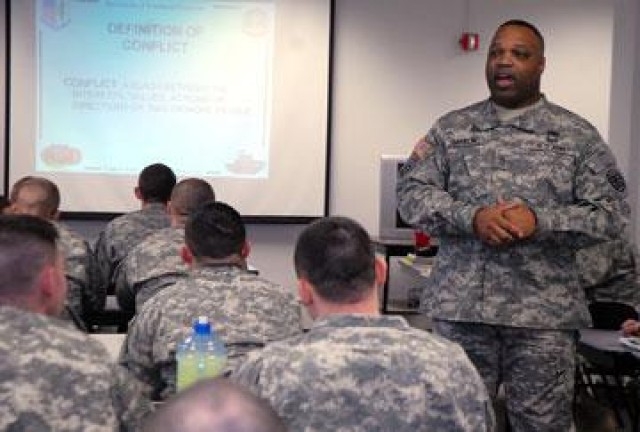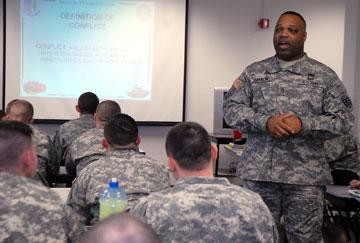
Internment and Resettlement Battalion Headqua... VIEW ORIGINAL
FORT LEAVENWORTH, Kansas - As a mental health professional working with death row inmates at the U.S. Disciplinary Barracks, Sgt. 1st Class Aljournal "A.J." Franklin has perhaps one of the most unique and challenging jobs on Fort Leavenworth.
Franklin is the noncommissioned officer in charge of the Mental Health Division, under the Directorate of Treatment Programs. He administrates a mental health facility, conducts face-to-face and group counseling, and provides training classes for personnel new to the USDB.
"Fort Leavenworth is unique in that the people we service are inmates in the Army's only maximum security prison," Franklin said. "We do counseling for inmates in groups, and a lot of that is crime specific."
Franklin said he volunteered to work with inmates sentenced to death, as well as other inmates in the Special Housing Unit who are segregated from the general population for disciplinary reasons. He said it's a real challenge to motivate inmates who in their minds believe they have nothing left to lose.
"The most rewarding part for me is to see change," Franklin said. "To see a person I've helped six months later and they're doing better, and they're happy, or even to hear them say something positive after they were initially very pessimistic, that's very rewarding. Personally, you take some pride in the fact that they've improved."
Franklin entered the Army as a combat signaler, military occupational specialty 31K. Originally from Charlotte, N.C., his first duty station was with the 82nd Airborne Division at Fort Bragg, N.C., a little more than two hours from home.
Franklin just missed the 82nd's fighting in Panama during Operation Just Cause in 1989, but deployed with the division in 1991 for Operation Desert Shield/Desert Storm. Later in 1991 he went to Panama for jungle training.
It wasn't long, however, before all the training and deployments made family life difficult.
"My first three years in the Army, my wife and I were together about 10 months. The rest of the time I was deployed or in the woods," Franklin said.
In 1993, Franklin changed his MOS to 68X, mental health specialist. He said he was drawn to mental health not only because it was something that interested him, but also because he was promised a regular working schedule in an Army hospital or clinic, which greatly pleased his wife.
After completing his MOS training, Franklin was sent to Fort Wainwright, Alaska. His other assignments include a tour in Germany, a deployment to Kosovo in 2002, and serving as an instructor for his MOS at Fort Sam Houston in San Antonio, Texas.
Franklin said he's learned that NCOs in mental health face challenges that don't exist in many other Army fields.
"In mental health there's lots of Soldiers and NCOs with advanced degrees, but in the Army that's not enough," Franklin said. "You have to be a total Soldier, do what other Soldiers do, excel and make yourself stand out."
1st Sgt. Ron Hussung of Headquarters and Headquarters Company, U.S. Disciplinary Barracks, is Franklin's supervisor; He described him as a model NCO.
"His level of decision making, work ethic and professionalism is unparalleled," Hussung said. "What is great about Sergeant First Class Franklin is he doesn't restrict his NCO duty and responsibility to the facility (the USDB), but assists with instituting new practices when dealing with stress-related conditions resulting from combat operations."
Franklin said his combat experience and service in units like the 82nd Airborne Division have helped him connect with Soldiers where other mental health professionals might not have succeeded.
"The things I've been through, the experiences I've had, they pay off big when I'm dealing with Soldiers. I've found that my varied experience, my array of duty assignments, they help me in meeting people where they are," Franklin said.
NCOs are often called the "backbone of Army," a phrase that Franklin said, "means we bear a lot of weight. A backbone needs to be strong, but also flexible. NCOs have to be a myriad of things," he said.
"An NCO has to be a Soldier first, and has to be willing to be a teacher and a counselor," Franklin said. "An NCO has to be all of those, and flexible enough to move between those roles effortlessly."
Just five months shy of 20 years in uniform, Franklin said his goal is to do 22 years, but that he's in no rush to retire.
"If I'm blessed again and make master sergeant, then I'll stay in a little longer. Right now my goal is to be as successful as I can every step of the way," he said.
"I didn't come into the Army as sergeant first class," Franklin often says. He said this lets the Soldiers and younger NCOs that he counsels know that while he's a senior NCO now, he also came up through the ranks and faced similar challenges and difficulties as them.
"I think as NCOs the best thing we can do is motivate younger Soldiers, less experienced Soldiers, to want to do better and to want to be better," Franklin said.

Social Sharing